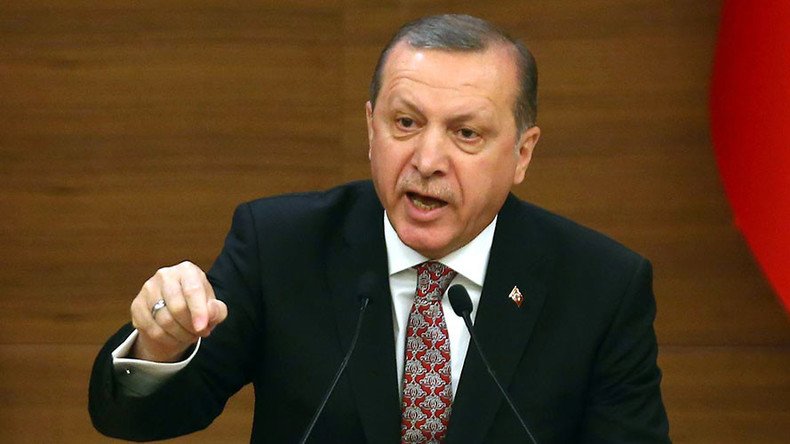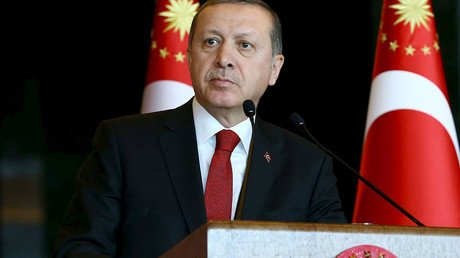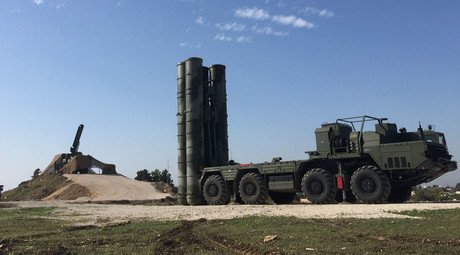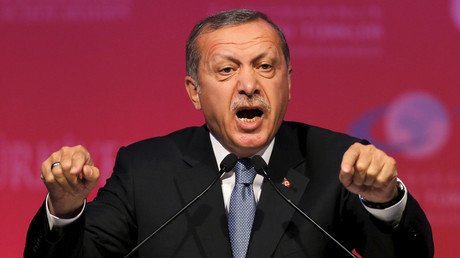Erdogan threatens Europe with new migrant wave, renews calls for no-fly zone in Syria

Turkish President Recep Tayyip Erdogan has warned that unless the EU loosens its purse strings and fulfils its commitment for financial aid to tackle the refugee crisis, Ankara could open the borders for those seeking asylum in Europe.
“In the past we have stopped people at the gates to Europe, in Edirne [in northwest Turkey] we stopped their buses. This can happen once or twice, and then we'll open the gates and wish them a safe journey,” Daily Sabah cited President Erdogan as saying during an address to the Young Businessmen Confederation of Turkey (TÜGİK) taking place in the capital Ankara.
Erdogan said he had voiced similar warnings to European leaders not just once, but “at every opportunity.”
The Turkish president claimed his country has already spent $9 billion on refugees – far more than the $455 million received from the UN to help with refugee accommodation.
The EU has promised €3 billion (US$3.4 billion) in aid, but Erdogan said Turkey has not seen any sign of the money.
Erdogan added that “it is hypocritical to remind Turkey of its international responsibilities,” in a clear reference to the UN’s urging of Ankara to welcome the Syrian refugees concentrating on its border.
Turkey has already accepted 2.6 million refugees, more than any other country, said Erdogan, pressing the UN to address its member states to make them accept some of the refugees currently residing in Turkey.
The Turkish president also made it clear he saw no way of ending the Syrian crisis without creating safe zones.
Although the Syrian conflict will soon be entering its sixth year, Erdogan asserted that it is the Russian airstrikes started four months ago that have forced Syrians to flee to Turkey. Another force generating the refugee influx is “Iran-backed groups” within Syria that are carrying out “merciless massacres,” Erdogan said, claiming that “ethnic cleansing” is underway in Syria.
“There is a chance the new wave of refugees will reach 600,000 if airstrikes continue. We are making preparations for it,” he said, adding that so far Turkey was showing patience, but is ready to do “what's necessary” and have buses ready to re-route refugees on to the EU.
Ankara’s allies have so far shown little support to the demand to establish a no-fly zone along the Turkish-Syrian border, primarily inhabited by Kurds, largely because that would imply coming in direct confrontation with Damascus and its primary ally Russia.
Moscow has deployed advanced S-400 and sea-based S-300 air defense complexes in Syria, taking practically all of the country’s airspace under tight control. Russian 4G++ Sukhoi Su-30 and Su-35 fighter jets, which can engage any existing warplane, are accompanying Su-24 and Su-34 bombers on every combat mission.
However, the Turkish leader still hopes to make the allies assist with establishing a no-fly zone. On Wednesday, Erdogan held the US accountable for making a “pool of blood” in the region when failing to recognize Kurdish organizations fighting Islamic State (IS, formerly ISIS/ISIL) in Syria as terrorist.
Syria and Russia have on many occasions accused Turkey of assisting Islamic State forces by allowing illegal oil business with the terrorist group, selling oil stolen from Iraqi and Syrian oil fields.
The conflict in Syria started in 2011 and has claimed an estimated 260,000 lives on all sides. It has left over a million people injured and forced millions more to leave their homes and become refugees abroad or displaced persons within Syria.
















